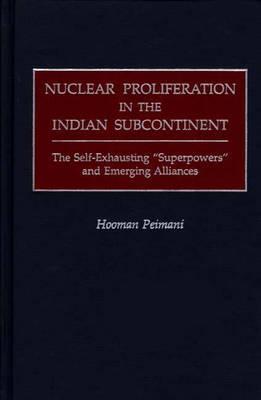Overview
The main impact of the May 1998 nuclear tests of India and Pakistan was not on the nuclear non-proliferation regime, Peimani asserts, but on the structure of the international system. The tests could not encourage massive nuclear proliferation as many natural factors prevent such a scenario, but they surely contributed to the weakening of the mainly American-dominated international system. The failure of nuclear India and Pakistan to achieve their objectives has increased their dissatisfaction with a system which they see as discriminating against them on the grounds of their insignificant nuclear arsenals and their severe underdevelopment. Given their limited resources, their attempts to deal with these problems in the near future and, in particular to develop credible arsenals, would be self-exhausting and not feasible. Their failure has turned them into dissatisfied regional powers who are being pushed toward forming alliances with their long-time friends, Russia and China, respectively. Each has strong reasons for dissatisfaction with the American system, which is marginalizing them. Their concerns about common enemies and threats as well as their economic and political needs are pushing these states toward the formation of tacit or official alliances. Decades of friendship and extensive ties make them natural allies and encourage the formation of an alliance between India and Russia on the one side, and China and Pakistan on the other. By creating strong regional poles, these predictably hostile alliances will contribute to the weakening of the international system and the consolidation of a rising multipolarity. Scholars, students, and researchers involved with foreign policy, American-Indian and American-Pakistani relations, and international military-political relations will find this analysis of particular interest.
Full Product Details
Author: Hooman Peimani
Publisher: Bloomsbury Publishing Plc
Imprint: Praeger Publishers Inc
Dimensions:
Width: 14.00cm
, Height: 1.20cm
, Length: 21.60cm
Weight: 0.364kg
ISBN: 9780275967048
ISBN 10: 0275967042
Pages: 168
Publication Date: 30 August 2000
Recommended Age: From 7 to 17 years
Audience:
College/higher education
,
Professional and scholarly
,
Undergraduate
,
Postgraduate, Research & Scholarly
Format: Hardback
Publisher's Status: Active
Availability: Manufactured on demand

We will order this item for you from a manufactured on demand supplier.
Reviews
?Pemani's book will contribute to our understanding of the significance of the nuclear rivalry between India and Pakistan in South Asia and beyond.?-The International History Review ""Pemani's book will contribute to our understanding of the significance of the nuclear rivalry between India and Pakistan in South Asia and beyond.""-The International History Review
"?Pemani's book will contribute to our understanding of the significance of the nuclear rivalry between India and Pakistan in South Asia and beyond.?-The International History Review ""Pemani's book will contribute to our understanding of the significance of the nuclear rivalry between India and Pakistan in South Asia and beyond.""-The International History Review"
?Pemani's book will contribute to our understanding of the significance of the nuclear rivalry between India and Pakistan in South Asia and beyond.?-The International History Review
Pemani's book will contribute to our understanding of the significance of the nuclear rivalry between India and Pakistan in South Asia and beyond. -The International History Review ?Pemani's book will contribute to our understanding of the significance of the nuclear rivalry between India and Pakistan in South Asia and beyond.?-The International History Review
Author Information
HOOMAN PEIMANI is an independent consultant who works with international agencies in Geneva and does research in international relations. His earlier research and writing has centered on the Persian Gulf, the Caucasus, and Central Asia. Earlier publications include Regional Security and the Future of Central Asia: The Competition of Iran, Turkey, and Russia (Praeger, 1998) and Iran and the United States: The Rise of the West Asian Regional Grouping (Praeger, 1999).




